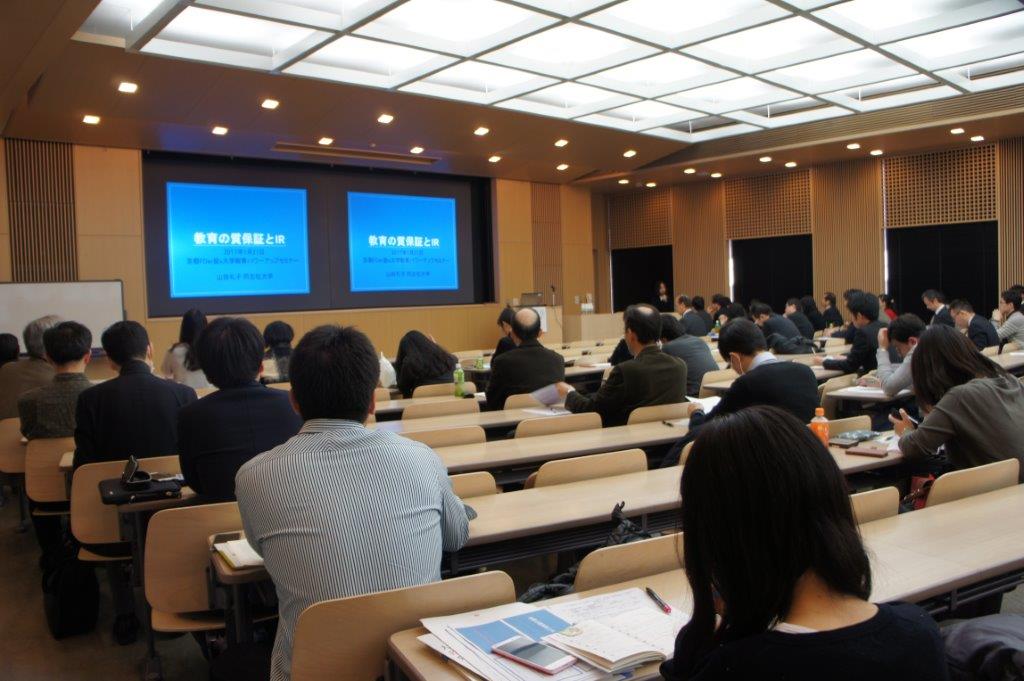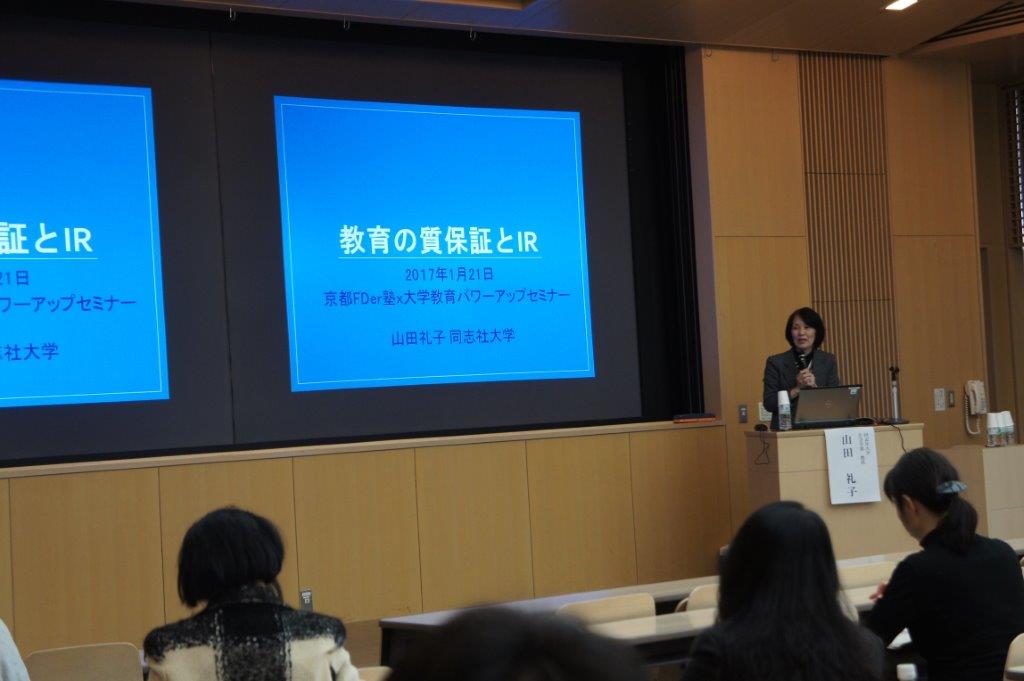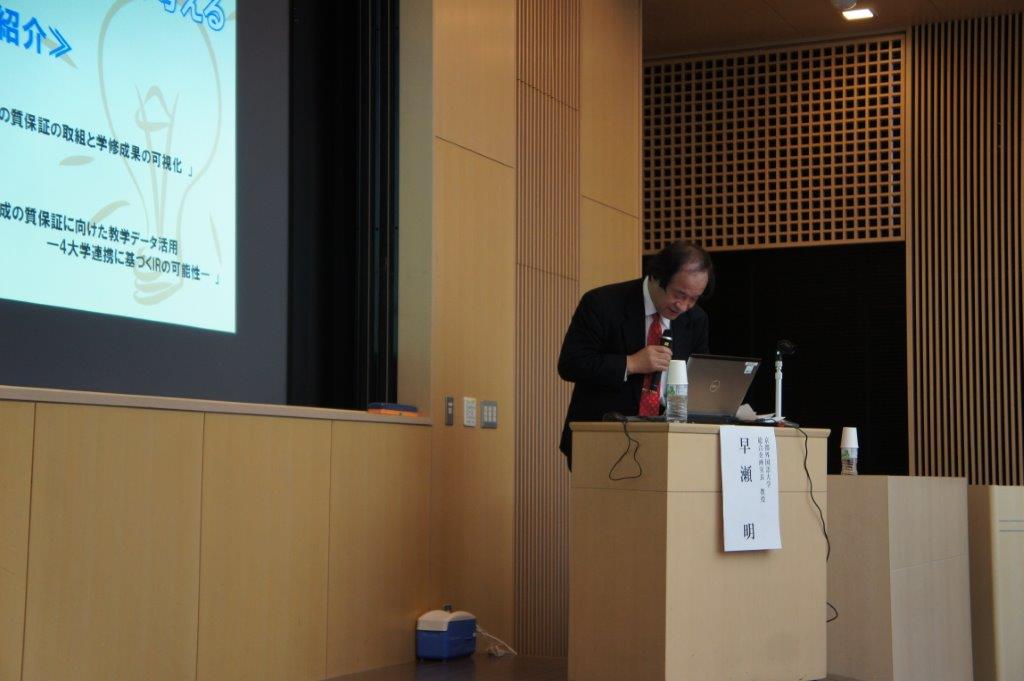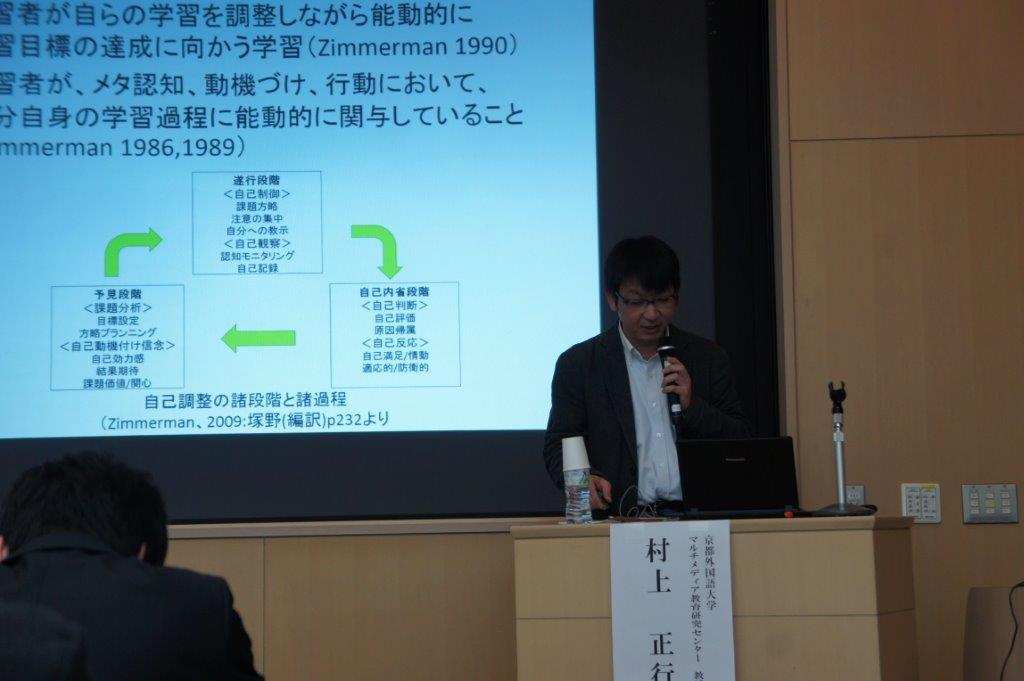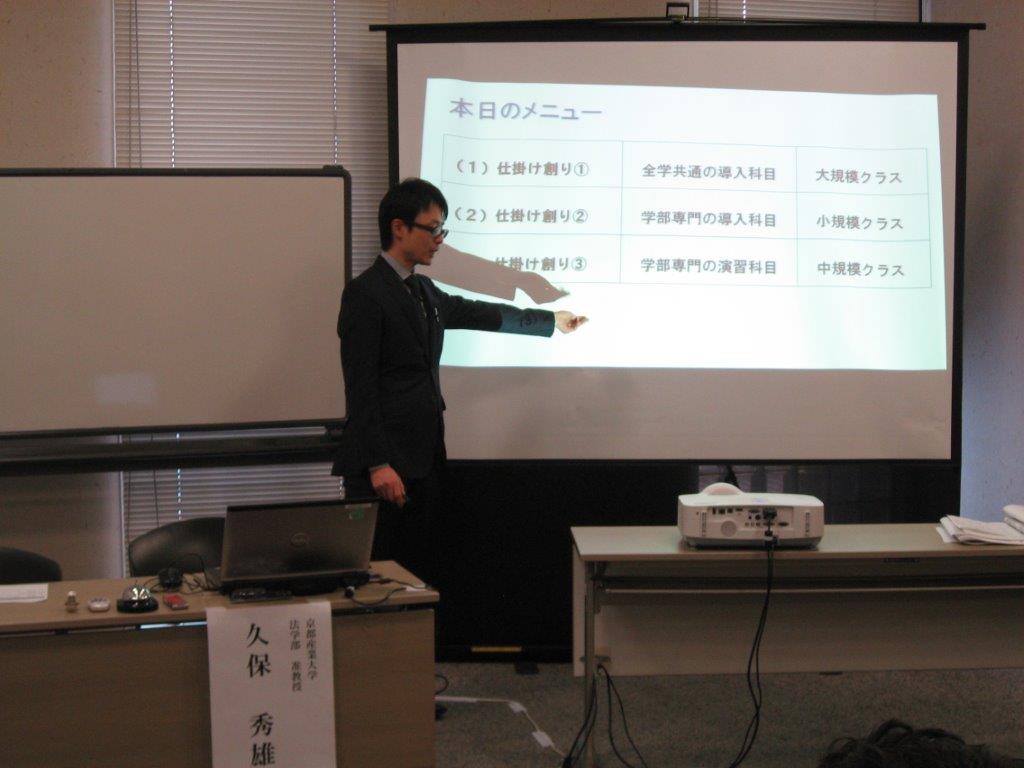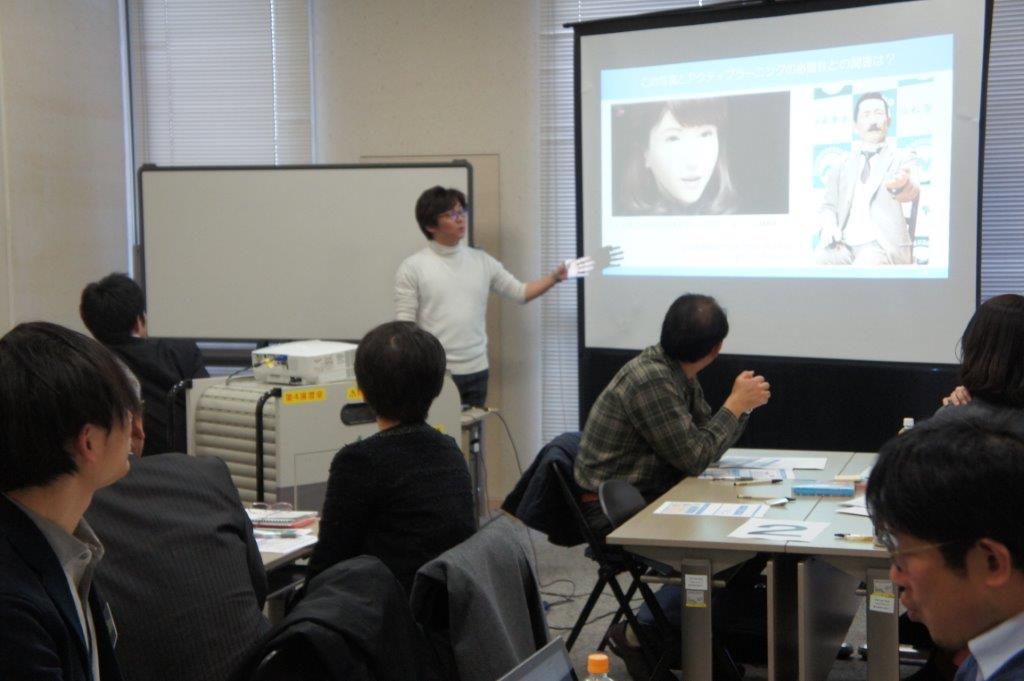Outline of the event
(In 2016, it will be held as a joint project with the University Education Power-up Seminar.)
In 2016, it will be held jointly with the University Education Power-up Seminar.
Kyoto FDer Juku will be held as a “Keynote Speech” and “Subcommittee A”.
2016 Kyoto FDer Juku × University Education Power-up Seminar Joint Project
Theme: “Thinking about Quality Assurance in Education”
While measures to ensure the quality of higher education are becoming more important, many universities are introducing GPA systems, visualizing learning outcomes, and are being required to develop IR functions and establish departments. In addition, at the field level, creativity in lessons, such as active learning and lesson design, is required on a daily basis. Against this background, this year, we will jointly hold a seminar on the power up of university education with Kyoto FDer School, and will give a keynote speech on the relationship between educational quality assurance and IR, and three subcommittees will introduce case studies and two workshops, which will incorporate both macro and micro perspectives.
- Date
- Saturday, January 21, 2017 13:00~17:00 (Doors open at 12:30)
- Venue
- Campus Plaza Kyoto, 5th floor, Lecture Room 1 and Seminar Room 2~4
- Organizer
- University Consortium Kyoto
- Target
- University faculty members, staff, and other university officials who are interested in FD
- Participation Fee
- For member schools: Free
Non-member schools: ¥1,000 (please pay at the reception on the day) - Occupancy
- Keynote speeches: 150
Breakout Group A: 110 people
Breakout Group B: 20 people
Breakout Session C: 20 people
*Applications will be accepted on a first-come, first-served basis. - Contents
- Information flyer [Click here for details]
| Keynote Speeches 13:00~14:30 [Capacity: 150 people] |
“Quality Assurance of Education and IR” Reiko Yamada (Professor, Faculty of Sociology, Doshisha University) |
|
| ≪ Overview≫ Many universities have already implemented measures such as the introduction of a GPA system, a CAP system, and the substantiation of credits against the backdrop of a desire for measures to promote quality assurance in higher education, but in order to make these measures fully functional and promote quality assurance, the development of a function called IR and the establishment of such departments are required. With the release of educational information, it is highly likely that centralizing data and processing data for “University Portraits” that will be in operation in the future will also be a new job for the IR department. Furthermore, amid the need to improve university governance, the view of IR as a tool to support governance is emerging. IR is said to have been born in the 1960s in higher education institutions in the United States. Investor relations departments are permanently established in many U.S. institutions of higher education, with the primary responsibility of acquiring, analyzing, and managing a variety of data within the university, including educational, managerial, and financial information, developing strategic plans, and preparing reports and self-assessments for accreditation agencies. As a result of these activities, it has a strong nuance of being a decision-making support department for organizational management, but it is also involved in the development of student surveys as a tool for improving education by accumulating and analyzing data for educational improvement. In this sense, it can be said that the IR department is deeply involved in the quality assurance of education within the university. Above all, the relevance of IR to internal quality assurance is high. In this talk, I will analyze the relationship between educational quality assurance and IR from the perspective of policy trends. |
||
| Breakout Sessions 15:00~17:00 【Capacity】 Breakout Session A: 110 people Breakout Session B: 20 people Breakout Session C: 20 people |
minute department meeting A |
Case Studies |
| (1) Kyoto University of Foreign Studies “Efforts to Ensure the Quality of Education at Kyoto University of Foreign Studies and Visualization of Learning Outcomes” Akira Hayase (Professor, General Planning Office) Masayuki Murakami (Professor, Center for Multimedia Education and Research) ≪ Overview≫ In 2014, Kyoto University of Foreign Studies was selected as a member of the Combined Program (Theme I and Theme II) of the Program for Acceleration of University Education Revitalization (AP). Behind this is the establishment of a university management system based on a five-year plan, and the quality assurance of education is positioned in it. In this report, we will explain the quality assurance of education at Kyoto University of Foreign Studies, and introduce the outline of the AP project, IR initiatives, and visualization of learning outcomes as concrete measures to achieve this goal. |
||
| (2) Aichi University of Education “Utilization of Teaching Data for Quality Assurance of Teacher Training at Aichi University of Education: The Possibility of IR Based on Collaboration with the Four Universities” Mr. Tetsuo Kyo (Lecturer, School Education Course) ≪ Overview≫ The Aichi University of Education’s Teacher Training and Development Collaboration Center is developing IR activities with the aim of improving teaching and learning in collaboration with Hokkaido University of Education, Tokyo Gakugei University, and Osaka Kyoiku University (HATO Project). In this presentation, we will introduce the specific details of the collaboration, such as the creation of an awareness survey of common items and the sharing of data, and mention the significance of the collaboration. In addition, as an attempt to ensure the quality of teacher training, we will report on the university’s efforts to achieve its educational goals based on the analysis of the freshman survey and the senior student survey. Ms. Hiroko Takeshi (Teacher Development Collaboration Center) Mr. Tetsuo Kyo (School Education Course) Ms. Mutsumi Takatsuna (School Education Course) Joint report of 3 people |
||
| minute department meeting B |
[Active Learning × Workshop] “Create a variety of mechanisms to encourage mutual learning and growth” Hideo Kubo (Associate Professor, Faculty of Law, Kyoto Sangyo University) ≪ Overview≫ Since active learning (AL) classes are largely dependent on the students, there is a considerable possibility that they will fail due to misunderstandings by the class administrator. Unlike a one-way lecture, there are many points to consider, such as the need to respond immediately to unexpected reactions and actions of students. Therefore, we would like to share the know-how of AL-type classes that can be used in a variety of variations, from first-year introductory education to specialized seminars, and from small-group subjects to non-AL classes, by working together to create mechanisms to solve problems that tend to arise in AL-type classes, and to refining the sense necessary for success in AL-type classes. |
|
| minute department meeting C |
[AL Lesson Design × Workshop] “Designing Classes that Bring Out ‘Proactive, Interactive, and Deep Learning'” Takeshi Yamada (Associate Professor, Center for Research and Development in Higher Education, Kyoto University) ≪ Overview≫ The development of human resources who can survive in modern society is the mission of higher education institutions, and it has become an urgent issue. At the center of this is the qualitative transformation of education and the improvement of the quality of classes, and active learning is recommended as a concrete method. This subcommittee will focus on how to design and implement classes that bring out “proactive, interactive, and deep learning” in a participatory workshop format. |
|
Application
- How to apply (e-mail application)
- Subject: “0121 Kyoto FD Application”
Text:
(1) Name (furigana)
(2) Affiliation (organization name, department)
(3) Faculty, staff, and others
(4) E-mail address
(5) Participation in the keynote speech: Example: Participation or non-participation
(6) Desired subcommittee: Entry example: Subcommittee A, Subcommittee B, Subcommittee C, non-participation
With the above contents,
Please send an e-mail to FDRD■consortium.or.jp (Please replace ■ with @).
We will send you a confirmation email after receiving your application. - Application deadline:
- Saturday, January 14, 2017
Implementation Report
On Saturday, January 21, 2017, the University Consortium Kyoto jointly organized the “Kyoto FDer School” and the “University Education Power-up Seminar” under the theme of “Thinking about Quality Assurance of Education,” which was attended by 99 people from member and non-member universities.
Ensuring the quality of education is an eternal challenge for universities, and many universities have introduced GPA systems, visualized learning outcomes, and are required to develop IR functions and establish departments. In addition, at the field level, creativity in lessons, such as active learning and lesson design, is required on a daily basis. Against this background, the keynote speech was given on the relationship between educational quality assurance and IR, and the second half was divided into three subcommittees (case studies, active learning workshops, and AL-type lesson design workshops).
First, in the keynote speech, Dr. Reiko Yamada (Professor, Faculty of Sociology, Doshisha University) gave a keynote speech on the theme of “Quality Assurance and IR in Education.” Although IR has become widespread in the university industry in recent years, about 70% of universities do not have a university-wide IR organization, and the IR function is limited and ambiguous.
In the second half, three subcommittees were held simultaneously, and in Session A, case studies were introduced by two universities, and Professor Akira Hayase (Professor, Director of the Planning Office) and Professor Masayuki Murakami (Professor, Multimedia Education and Research Center) of Kyoto University of Foreign Studies introduced case studies on “Efforts to Ensure the Quality of Education and Visualization of Learning Outcomes at Kyoto University of Foreign Studies,” which was adopted as part of the University Education Revitalization Acceleration Program (AP) project. Dr. Tetsuo Kyo (Lecturer, School Education Course, Aichi University of Education) gave a case study on “Utilization of Teaching Data for Quality Assurance of Teacher Training at Aichi University of Education: The Possibility of IR Based on Collaboration with the Four Universities.”
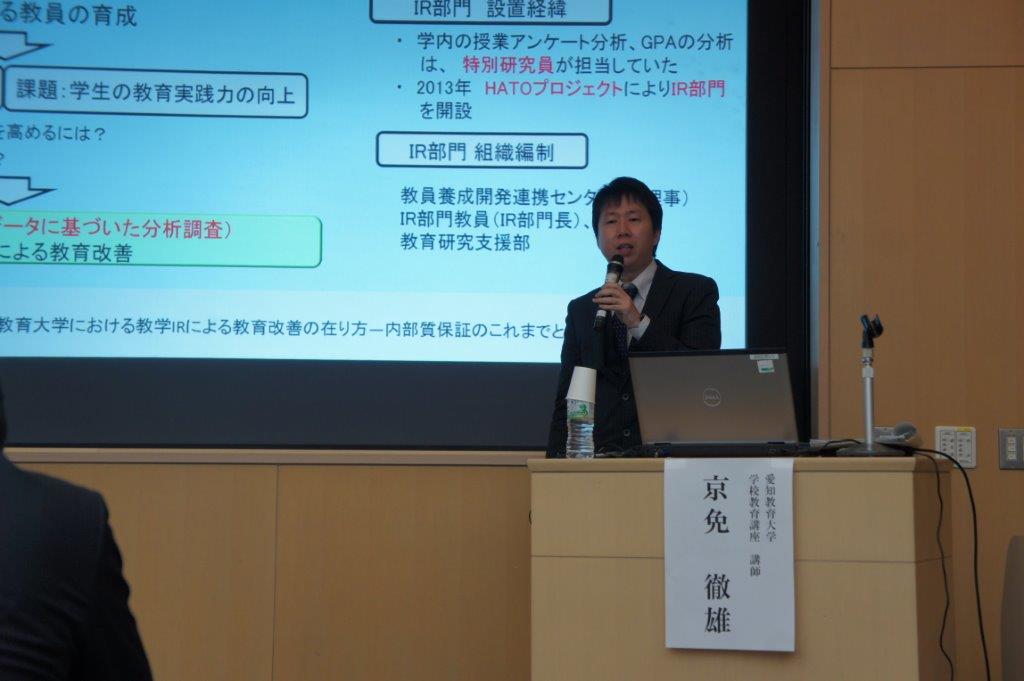
In Session B, a workshop was held with the keyword of active learning, which is equivalent to a seminar on powering up university education, and Professor Hideo Kubo (Associate Professor, Faculty of Law, Kyoto Sangyo University) talked about the work of creating mechanisms to solve problems that tend to arise in active learning classes under the theme of “Creating various mechanisms to promote mutual learning and growth.”
In Session C, a workshop was held on AL-type lesson design, which is equivalent to a seminar on power-up university education, and Professor Takeshi Yamada (Associate Professor, Center for the Promotion of Research and Development in Higher Education, Kyoto University) gave a lecture on “Proactive, Interactive and Deep Learning” under the theme of “Designing Classes that Bring Out ‘Proactive, Interactive, and Deep Learning.'” He talked about the design of the lesson and its implementation to bring out the best in it.
Finally, in the results of the questionnaire for this joint project, 57 out of 61 respondents answered that they were “satisfied” or “somewhat satisfied” with the overall satisfaction, indicating a high level of satisfaction. In particular, all respondents answered that they were “satisfied” with the satisfaction of subcommittees B and C, making the workshop-style breakout sessions very meaningful.
In addition, many positive comments were received, such as, “I was able to understand the meaning of IR from the perspective of the situation surrounding the university and learn about specific educational activities,” “I felt a sense of fulfillment in the two-part structure, and I thought that it would be better if faculty and staff of each generation were aware of it as a whole and individually,” and “I was able to obtain information that will lead to solutions to issues that are facing the university.”
Inquiries
University Consortium Kyoto FD Project
TEL 075-353-9163 FAX 075-353-9101
〒600-8216 Shimogyo-ku, Kyoto-shi, Nishitoin-dori, Shiokoji, Shimo-ku, Kyoto, Campus Plaza Kyoto
* Business hours: Tuesday ~ Saturday 9:00 ~ 17:00 (excluding year-end and New Year holidays)














